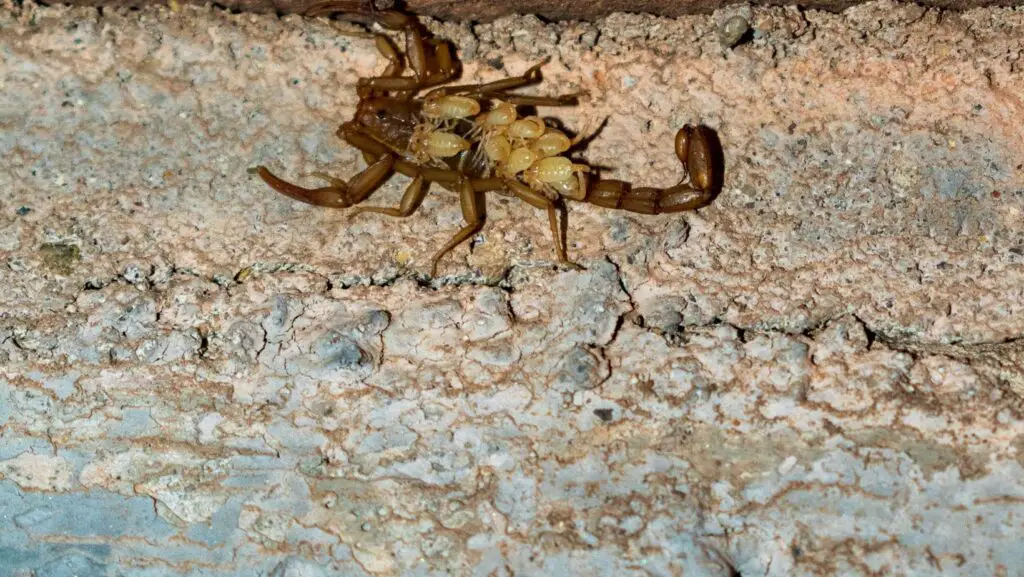No, scorpions do not die after giving birth. Scorpions are arachnids, and like other arachnids, they reproduce sexually. Female scorpions carry their young internally and give live birth to a brood of fully formed miniature scorpions. The number of offspring can vary depending on the species, but it can range from a few to over a hundred. After giving birth, the mother scorpion may continue to care for her young by carrying them on her back until they are ready to disperse. The mother scorpion can survive and continue to live after the birthing process.
How Do Scorpions Give Birth?
Scorpions give birth through a process called viviparity, which means they give live birth instead of laying eggs. Here’s an overview of how scorpions give birth:
- Mating: Male and female scorpions engage in a courtship ritual, which involves a series of behaviors to ensure successful mating. Once mating occurs, the male deposits a sperm packet called a spermatophore onto the ground.
- Internal fertilization: The female scorpion picks up the spermatophore with her genital opening, located on the underside of her abdomen. The sperm travel up into her reproductive system, where fertilization of the eggs takes place.
- Embryo development: The fertilized eggs develop inside the female scorpion’s body. The embryos receive nourishment from a yolk sac, and the mother’s body provides protection and an optimal environment for their development.
- Birthing process: When the embryos have developed sufficiently, the mother scorpion gives birth to live offspring. The newborn scorpions, called scorplings, are miniature versions of the adults and already have exoskeletons and functional pincers.
- Maternal care: After birth, the mother scorpion may continue to carry the scorplings on her back. This behavior provides protection and increases their chances of survival during their early stages. The scorplings will gradually disperse and start their independent lives.
It’s important to note that the specific details of the birthing process can vary between scorpion species, but the overall process of viviparity remains consistent.
Can Scorpions Get Pregnant Without A Male?
No, scorpions cannot get pregnant without a male. Scorpions reproduce sexually, which means that both a male and a female are required for successful reproduction. The male scorpion transfers sperm to the female during mating, and the fertilization of the eggs takes place internally within the female’s reproductive system. Without the involvement of a male, there is no fertilization, and therefore, the female scorpion cannot become pregnant or produce offspring.
How Long Is A Scorpion Pregnant?
For instance, smaller scorpion species tend to have shorter gestation periods, while larger scorpions may have longer ones. Additionally, the availability of food, temperature, and other environmental factors can impact the development and growth rate of scorpion embryos.
In general, scorpions have relatively long gestation periods compared to many other arthropods. This extended period allows for the development of fully formed scorplings that can survive independently after birth.

Why Is My Scorpion Eating Her Babies?
It is not uncommon for female scorpions to cannibalize or eat their own offspring. There are a few potential reasons why this behavior occurs:
- Lack of food: Scorpions require an adequate food source to sustain themselves and their offspring. If the mother scorpion is unable to find enough food, she may resort to eating her own young as a source of nutrition.
- Stress or disturbance: Scorpions are sensitive to their environment, and if they feel threatened or stressed, it can trigger defensive behaviors, including cannibalism. Factors such as excessive handling, disturbances in their habitat, or overcrowding can contribute to stress levels.
- Lack of maternal instinct: Some scorpion species have weaker maternal instincts compared to others. In these cases, the mother may not exhibit the typical nurturing behaviors and may even see her offspring as potential prey.
- Survival instinct: In harsh environments or when resources are scarce, the mother scorpion may prioritize her own survival over the survival of her offspring. By consuming her young, she ensures that she can allocate the limited resources to her own survival.
It’s important to note that cannibalism among scorpions is a natural behavior, and it can occur even under optimal conditions. However, if the cannibalism appears excessive or persistent, it may be worth evaluating the environmental conditions and ensuring that the scorpion has an appropriate diet, adequate space, and a suitable habitat to minimize stress levels.
How Does A Mother Scorpion Die?
A mother scorpion typically does not die as a direct result of the birthing process. After giving birth, the mother scorpion can continue to live and survive. However, like all living organisms, scorpions have a finite lifespan, and the mother scorpion will eventually die due to natural causes or external factors.
The lifespan of a scorpion varies depending on the species, but most scorpions live for several years. Factors such as environmental conditions, availability of food, habitat quality, and predation can influence the lifespan of a scorpion. Additionally, individual health and genetic factors also play a role in determining the lifespan of a scorpion.
It’s important to note that scorpions are not programmed to die after giving birth. They have the potential to live beyond the birthing process, and their lifespan is determined by a combination of internal and external factors that affect their overall health and well-being.
Do Scorpions Eat Their Mother After Birth?
No, scorpions do not typically eat their mother after birth. Scorpions are not known to exhibit maternal cannibalism where the offspring consume the mother. Once the scorpion offspring, known as scorplings, are born, they tend to disperse and start their independent lives. While scorpions may engage in cannibalistic behavior in certain circumstances, such as when resources are scarce or during territorial disputes, it is not a common behavior for scorplings to consume their mother.
![Do Scorpion Die After Giving Birth? [Myth Busted]](https://thescorpionhobby.com/wp-content/uploads/2023/05/Do-Scorpion-Die-After-Giving-Birth.jpg)